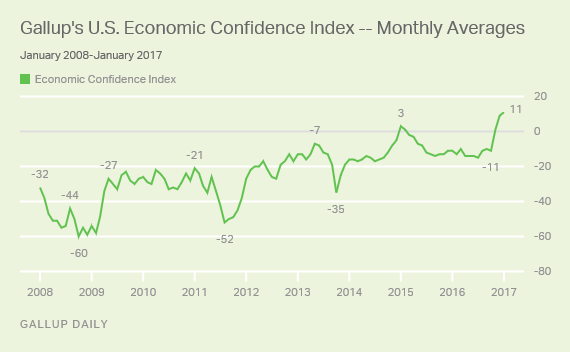
Another month, another all time high in Americans' confidence in the US economy.
In its latest, January report, Gallup found that Americans' confidence in the U.S. economy averaged +11, the highest monthly average in Gallup's nine-year trend. Some of January's three-day averages also marked new highs in Gallup's tracking since 2008. The index peaked at +19 for the Jan. 21-23 three-day average after President Donald Trump's inauguration and shortly before the Dow Jones industrial average hit a new high.
January's +11 score marks the third consecutive month the index has been in positive territory. This is a new feat for an index that has had mostly negative monthly measures since its inception, except for January and February 2015. Gallup's U.S. Economic Confidence Index is the average of two components: how Americans rate current economic conditions and whether they feel the economy is improving or getting worse. The index has a theoretical maximum of +100 if all Americans were to say the economy is doing well and improving, and a theoretical minimum of -100 if all Americans were to say the economy is doing poorly and getting worse.
In January, 31% of Americans rated the economy as "excellent" or "good," while 21% said it was "poor," resulting in a current conditions score of +10 -- marking the highest monthly reading for this component since 2008. The economic outlook component also reached a new high score of +11 in January. This score was the result of 52% of Americans saying economic conditions in the country were "getting better," while 41% said they were "getting worse."
[image]https://content.gallup.com/origin/gallupinc/GallupSpaces/Production/Cms/POLL/svhv9dc-hk234vkckmivlw.png[/image]
Not surprisingly, the sentiment - as everything else about the US these days - broke down by party lines, with Republicans' confidence soaring by double-digit January. Specifically, Gallup found an immediate improvement in Republicans' confidence in the economy after the November presidential election, and their confidence has only grown since Trump took office. In January, the index rating among Republicans was +27, up 11 points from December's score of +16. Independents' +5 index score in January remained steady from their +3 reading in December.
Meanwhile, on the other end of the spectrum, Democrats' confidence has fallen each month since October, with their index score now at +4 -- their lowest since the aftermath of the federal government shutdown in October 2013.
[image]https://content.gallup.com/origin/gallupinc/GallupSpaces/Production/Cms/POLL/ep-my7k77u6znuovca-auq.png[/image]
Overall, confidence remains higher than it was before the 2016 election. While Republicans' January +27 score matches Democrats' October 2016 score, Democrats today are much more positive about the economy than Republicans were before the election. Independents are also significantly more positive now than they were before the election.
* * *
However, despite the largely Republican-driven euphoria, the honeymoon may be starting to fade, and the index's high point has note lasted. The three-day averages have since dipped to smaller single-digit scores, including a +8 average for Feb. 3-Feb. 5.
Gallup's bottom line:
Republicans' improved confidence in the economy upon Trump taking office was perhaps expected, as Democrats enjoyed similar levels of confidence during President Barack Obama's tenure. But with the inauguration confetti now settled, Americans of all political stripes will need to see results of an improving economy to maintain this high degree of confidence, which already appears to be slipping in early February's three-day rolling averages. The promising jobs report from the Bureau of Labor Statistics could be the strong footing Trump needs to maintain this elevated level of economic confidence. Americans may also feel bolstered by the robust Dow Jones industrial average, which hasn't yet lost its recent gains.
And then there is the other observation we made yesterday, namely that when it comes to the capital markets, the correlation between the S&P and yields with Trump's approval rating is almost 1.
In short, while for now the market and consumer confidence still remain euphoric, the first sign that Trump will be unable to deliver, and the divergenve between hope and reality is noted, is when traders can expect the next market correction.